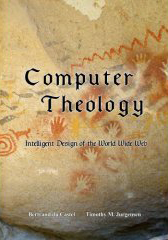PRESS
COMPUTER THEOLOGY |
||||
|
that the words of the prophets indeed came from God, or
gods, or as a principle of immanent truth, or other establishments of the
necessarily immutable terminal source of trust. Within a
theistic religion, policy emanates from the deity or deities that comprise the
foundation of the religion. Alternatively, it comes from the same organizing
process from which trust derives, in the case of non-theistic religions. In
either case, this derivation of policy generally appears to take a very special
person to establish the statements of policy under the auspices of the ultimate
trust arbiter of the particular social ecosystem. We suggest, then, that this
ultimate human policy purveyor is the shaman. In various religions, the
policy purveyor is known by other names: prophet, lawgiver and the enlightened
one. Mircea Eliade has made a seminal review of shamanistic practices in Shamanism, Archaic Techniques of Ecstasy.
In virtually every case related through anthropology or history, it appears to
require the abilities of select, chosen ones to translate the rules given by
the deities, or from the ordained process, into the compendium that other
believers can access. One explanation would be that only the shaman’s ecstasy
allows refinement of the trust infrastructure with the necessary detachment
from the very policies that are effected by the change. Once the trust
infrastructure is in place, its conveyance to policy can take place.
Ritual provides a direct connection to human emotions.
Consequently, as an aesthetic facility it can bear directly on the conveyance
of trust. Few of us have not felt the appeal of certain songs. Often we
associate them with particular events or times in our lives, and to hear them
over and over again still evokes something of that original feeling. This is,
in essence, ritual in the small. Expand upon it a bit and you get the primitive
exhilaration of a rock concert or the stirrings of patriotic fervor when the
Marine Corps Band (The President’s Own) launches into Semper Fidelis.
This comes closer to ritual in the large. Religion has proven exceedingly
innovative in the use of such ritual to evoke a common emotional state among a
group of believers. From the great chorales to Gregorian chants, the music of
religion can instill a variety of emotional states in its listeners, states
that make this audience particularly receptive to trust induced reception and
acceptance of messages of many types; from a more abstract view, statements of
policy. When properly applied, such emotional programming has similar
characteristics to protocols as we have discussed them; protocols through which
desired interactions can transpire. An interaction
can be characterized by a collection of protocols, each of which deals with a
specific aspect of the interaction. Each protocol involves a series of
well-defined steps with decision points interspersed along the way. By
following the steps, one is led to the decision points. Each outcome from a
decision point then points to a new set of steps which lead to the next
decision point. With the outcome of the final decision point of the protocol,
the protocol is completed and the interaction is in a known state. A more
generic term for this concept of protocol is a ritual. Either a ritual
or a protocol provides a process through which the parties to an interaction
can establish a common state. If the resultant state is one of emotional
ecstasy within the human mind, then it becomes an effective means of
establishing or reinforcing trust originally derived from that state. As such,
ritual becomes a powerful means for establishing or reinforcing trust within a
group whose members engage in the ritual in some form of concert. Islam makes
use of its Five Pillars that comprise a set of rituals through which the
faithful maintain or renew their trust in the faith. Of these, Salah, the daily
prayer that must be offered five times each day while bowing toward |
||||
|
||||
© Midori Press, LLC, 2008. All rights reserved for all countries. (Inquiries) The contents of ComputerTheology: Intelligent Design of the World Wide Web are presented for the sole purpose of on-line reading to allow the reader to determine whether to purchase the book. Reproduction and other derivative works are expressly forbidden without the written consent of Midori Press. Legal deposit with the US Library of Congress 1-33735636, 2007.
|
ComputerTheology Intelligent Design of the World Wide Web Bertrand du Castel and Timothy M. Jurgensen Midori Press, Austin Texas 1st Edition 2008 (468 pp) ISBN 0-9801821-1-5 |
Book available at Midori Press (regular) |
